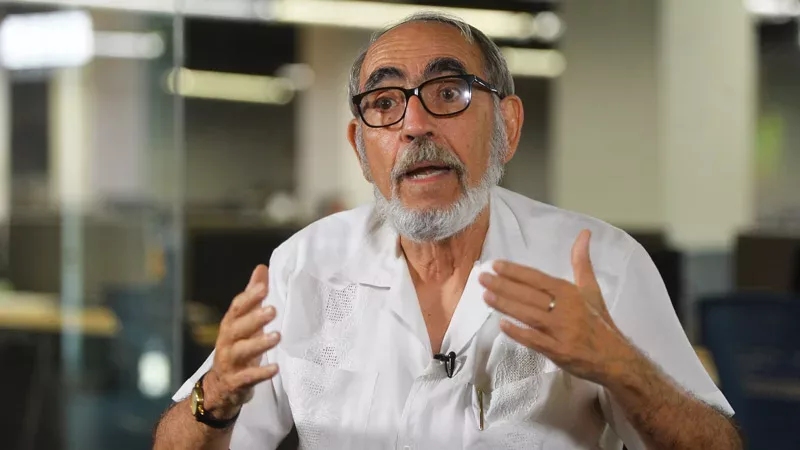As a “frightful farce.” This is how political analyst and former ambassador of El Salvador in Washington, Rubén Zamora, described the recently approved law on the vote abroad and speaks of possible fraud in the elections of 2024.
Last October 18, the Legislative Assembly approved the Special Law for the Exercise of Suffrage Abroad, which defines in-person and remote electronic voting for Salvadorans residing abroad and has caused doubts and accusations due to the lack of guarantees regarding the secrecy of the next elections.
For example, the Salvadoran ex-diplomat said in declarations to El Diario de Hoy that this regulation should be called “law to make an electoral fraud organized by the Government or law to violate the laws.”
Article 13 of the new law states that under no circumstances will Salvadorans abroad be obliged to make an alternate registration for the exercise of their vote (there will be no electoral roll to know the universe of voters). On this point, Zamora questions that article 77 of the Constitution of the Republic establishes that to exercise suffrage, it is an “indispensable condition” to be registered in the electoral registry prepared by the TSE.
The recently approved law orders the creation of an electoral registry with data from the National Registry of Natural Persons (RNPN), the General Directorate of Migration and Foreigners (DGME), and the Ministry of Foreign Affairs. However, the Supreme Electoral Tribunal (TSE) still needs to explain how this registry will be formed clearly. Furthermore, article 14 of the law states that Salvadorans will exercise the remote vote by internet with an identity document with a domicile abroad.
Given this, the analyst warns about a presumed “fraud” in 2024 since he considers that there will be no control regarding using the Single Identity Document (DUI). Therefore, these documents could be used to vote “several times” online.
“The law approved by the Assembly allows votes of those who claim to have the DUI, that is, the electoral roll does not support it and also admits that the DUI may be expired, then any identity document or even one manufactured by the government can vote,” he said.
The analyst considered that the government “was preparing everything for a possible electoral fraud,” In this sense, he recalled that “the government is the only one that controls the RNPN after removing the opposition parties.”
This is about the reforms approved by Bukele’s deputies last June 13 on the Organic Law of the RNPN, with which they left out the representation of the opposition political parties from the board of directors of said entity.
In this sense, Zamora questioned where the opposition parties would be able to watch and be present in all this, using DUIs to vote repeatedly. He answered the question: “They will not be able to do it. This is a frightful farce”.
Rubén Zamora: Ley del voto exterior es una “farsa” para hacer fraude en 2024
Como una “farsa espantosa”. Así calificó la recién aprobada ley de voto exterior, el analista político y exembajador de El Salvador en Washington, Rubén Zamora, quien habla de un posible fraude en las elecciones de 2024.
El 18 de octubre pasado, la Asamblea Legislativa aprobó la Ley Especial para el Ejercicio del Sufragio en El Exterior, en la que se define el voto electrónico presencial y remoto para los salvadoreños residentes en el exterior, y que ha causado dudas y señalamientos ante la falta las garantías sobre la secretividad de las siguientes elecciones.
Por ejemplo, el exdiplomático salvadoreño dijo en declaraciones a El Diario de Hoy que esta normativa debería de llamarse “ley para hacer un fraude electoral totalmente organizado por el Gobierno o ley para violar las leyes”.
El artículo 13 de la nueva ley dice que bajo ninguna circunstancia, los salvadoreños en el extranjero estarán obligados a realizar un registro alterno para el ejercicio de su voto (no habrá padrón para conocer el universo de votantes). Sobre este punto, Zamora cuestiona que el artículo 77 de la Constitución de la República establece que para ejercer el sufragio es “condición indispensable” estar inscrito en el registro electoral elaborado por el TSE.
La ley aprobada recientemente ordena la creación de un registro electoral con datos del Registro Nacional de las Personas Naturales (RNPN), la Dirección General de Migración y Extranjería (DGME) y el Ministerio de Relaciones Exteriores. No obstante, el Tribunal Supremo Electoral (TSE) aún no ha explicado con claridad cómo conformará este registro. Además, el artículo 14 de la ley dice que el voto remoto por internet será ejercido por los salvadoreños con documento de identidad con domicilio en el extranjero.
Ante esto, el analista advierte sobre un presunto “fraude” en el 2024 ya que considera que no habrá fiscalización respecto al uso del Documento Único de Identidad (DUI) y por tanto, estos documentos podrían usarse para votar “varias veces” por internet.
“La ley que aprobó la Asamblea permite votos del que dice tener el DUI, o sea no está respaldado por el padrón y ademas admite que el DUI puede estar vencido, entonces cualquier documento de identidad o incluso uno fabricado por el gobierno puede votar”, dijo.
El analista consideró que el oficialismo “fue preparando todo para un posible fraude electoral” y en ese sentido recordó que “el gobierno es el único que controla el RNPN luego de sacar a los partidos de oposición”.
Esto en referencia a las reformas aprobadas por los diputados de Bukele el 13 de junio pasado sobre la Ley Orgánica del RNPN con las que dejaron fuera a la representación de los partidos políticos opositores de la junta directiva de dicha entidad.
En ese sentido, Zamora cuestionó dónde van estar los partidos de oposición con la capacidad de vigilar y estar presentes en todo esto, en eluso de DUIs para votar repetidas vece; y ante la interrogante respondió: “No podrán hacerlo. Esto es una farsa espantosa”.

